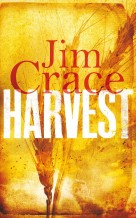Who owns the land? — Those who till it or those who hold the title deeds? How permeable should a community’s boundaries be? — Welcoming of all or divided into “insiders” and “interlopers”?
These pithy questions lie at the heart of Harvest by Jim Crace; the novel tipped by many as the Man Booker Prize 2013 winner to be announced next week.
Harvest’s narrator, Walter Thirsk, allows us to see the depths of these issues and their universality. He’s well placed to narrate the tale because he was once an outsider himself — having come into the village 12 years ago with Master Kent, his “milk cousin”, and the lord of the manor by marriage.
Walt and Master Kent were both suckled by Walt’s mother.
After moving to the village as Master Kent’s servant, Walt marries a local woman, gains acceptance of sorts and settles into the agrarian life.
Walt and Master Kent become widowers — the latter quite recently.
In the early stages of the tale Walt reflects, “There’s not a not a village, sea to sea, that receives fewer strangers.”
Sheaf and sheep
It’s harvest time in Walt’s close-knit, rural, English hamlet.
“Reap and gossip. That’s the rule,” he says. “Our humour ripens as the barley falls.”
The Queen of the Gleaning is about to be chosen and the harvest celebrations to begin.
However, three outsiders — two men and one beguiling woman called Mistress Beldam — arrive on the borders of the hamlet and set up camp.
Another stranger, “with a wealthy beard”, surveys the stubbled fields and landholdings, scratching away at a drawing board.
In times of plague, and leaner harvests, which of these outsiders poses the larger threat?
When the manor’s stable and haylofts are set on fire the community is quick to blame the trio and sets out to punish them cruelly.
Walt has his suspicions that it wasn’t their doing but that of local youths who’d consumed too many magic-mushrooms, known to the locals as “moon balls”.
Unfortunately, he stays quiet.
Due to a burnt hand, Walt can’t thresh with the other villagers and so is assigned to work with Mr Quill the surveyor.
He soon learns that the survey and the change it foreshadows are not Master Kent’s doing — or his desire — but that of his dead wife’s cousin, Edmund Jordon, the legal inheritor of the land.
As Walt dryly observes, “The sheaf is giving way to sheep.”
By the time Walt chooses to act defiantly in the face of this tumultuous change, the moment for action that could have made a difference has passed.
“Whatever courage I’d discovered briefly in drink had by now been almost entirely gagged and pissed into the once sweet-smelling garden, and I no longer could pretend to be the hero of the field. I was too wretched to be a hero of the field. I could hardly stand.”
He cooks up a plan to point the finger at Mistress Bedlam for further bad occurrences and, in doing so, falls back on one of the oldest stories in human history: Blame the woman.
Harvest gleaned
Harvest, as Justine Jordon wrote in The Guardian, “dramatises one of the great under-told narratives of English history: the forced enclosure of open fields and common land from the late medieval era on, whereby subsistence agriculture was replaced by profitable wool production and the peasant farmers dispossessed and displaced.”
Author Jim Crace handles this dramatisation with deceptive simplicity, controlled pathos and a steady hand.
The world he creates comes to us from the mind of one character, who is constantly theorising and telling himself stories. Harvest could easily have felt one-dimensional but, mercifully, doesn’t.
The language Crace employs to embellish the story has an arcane flavour and takes a while to get used to, yet it is never cringe-worthy or overly difficult to read.
Here’s a tiny sample, in which Walt reflects on the shape of the widow Gosse — with whom he shares a lusty appetite: “She calls it widow’s spread and is not the least concerned — the opposite — when, lying on her back with me on top, her creamy stomach sways and frowns like a shaken posset.”
The more serious “harvest” I gleaned from the book is this:
- Greed changes our landscapes until they are unrecognisable. As Walt says: “We’re used to looking out and seeing what’s preceded us, and what will also outlive us. Now we have to contemplate a land bare of both.”
- Dispossession is traumatic. And it’s worth bearing in mind that you could be the stranger at the gate one day.
- Intensive farming may well have its roots in medieval times but this, and the attendant climate change, are now significant environmental threats.
We reap what we sow.
The Man Booker Prize 2013 winner will be announced on October 15.




Recent Comments